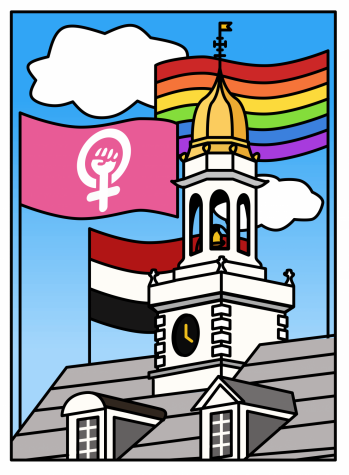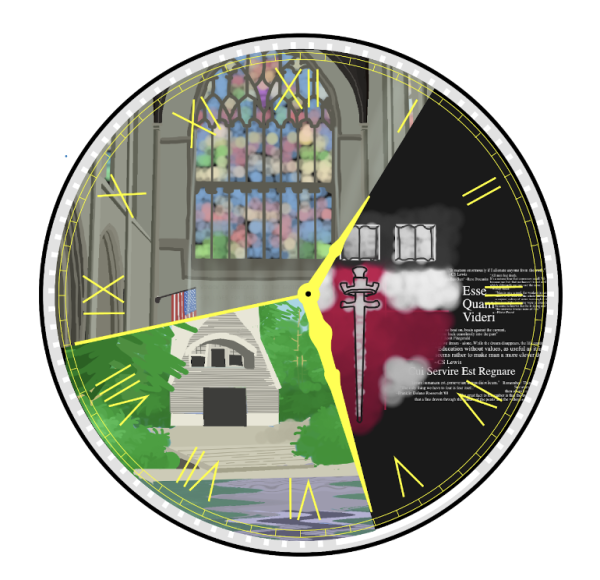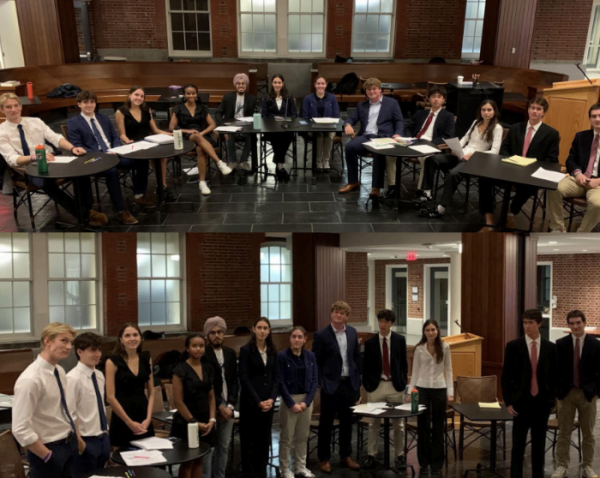Inside the Disciplinary Committee
Two weeks into the academic year, Associate Head of School Andy Anderson and Headmaster Temba Maqubela selected Alan Du ’20 to serve as the non-senior prefect on the Disciplinary Committee (DC).
The DC provides Mr. Maqubela with a recommendation for a fair course of punishment. It is comprised of the two senior prefects, both fifth form officers, one sixth former that is not a senior prefect, and three faculty members. Students and faculty members agree upon their recommendation based on what they believe is thoughtful and fair for the severity of the school rule violation. This year, the senior prefects are Lwazi Bululu ’20 and Grace Mastroianni ’20; the fifth form officers are Gracie Mumford ’21 and Trey Whitehead ’21; Alan Du ‘20 is the non-senior prefect sixth former; and Mr. Anderson, English teacher Martha Gracey, and Latin teacher Mary-Frances Bannard are the faculty members.
When asked what qualities they look for when selecting the final student to sit on the DC, Mr. Anderson described a student who is thoughtful, sensitive, and respected by his peers. This year, Mr. Maqubela and Mr. Anderson believe that Alan is the member of the sixth form that best represents these qualities.
In addition to faculty members’ praise, Andrew Mazza ’20 said, “He is a great person to serve on the DC because he is an honest, good guy who doesn’t have any biases with anyone.”
As one of the newer members of the DC, Alan said that he hopes to “contribute an international perspective to the DC and help make fair decisions.”
Groton’s Disciplinary Committee was not always comprised of mostly students. According to Mr. Anderson, until the late-1960s, the Headmaster decided everything with no recommendation from a DC. In an interview, Mr. Anderson described the reason behind a jury of peers: “Students understand other students and the pressure that they’re under a little bit better compared to us faculty members.”
Senior prefect and member of the DC for the past two years, Grace Mastroianni ’20 said, “One aspect of our disciplinary system that I think is important is the fact that each case is dealt with uniquely.”
Mr. Anderson elaborated on Grace’s point, adding that decisions are not strictly based on precedent. Groton’s DC handles each case on an individual basis, as no two violations of a major school rule have the same circumstances and motives. For example, a student that plagiarizes but admits it right away will be treated differently than a student who lies about plagiarizing until the teacher locates the exact written work that the student copied. The DC process aims to be as fair and just as possible, which hopefully allows each student to be both honest and held accountable for their actions. ’21
Inside the DC: How the Disciplinary Committee works
Oftentimes, new students as well as returning students remain unaware of Groton’s disciplinary procedures.
Dean of Students Michael O’Donnell noted that when the Deans learn of a student breaking a major school rule, either Assistant Dean of Students Libby Petroskey or he will talk one on one with the student. Then, they will present Mr. Maqubela and Mr. Anderson with the details of the student’s infraction.
Mr. O’Donnell said that the goal of the Deans’ Office in the disciplinary process is “to provide the clearest picture of the issue we can, including the student’s side of the story, in order to allow Mr. Maqubela to make an informed decision about how best to proceed.”
If Mr. Maqubela decides that the student should be brought before the DC, Mr. Anderson will set a date for the DC within the next few days.
During the Disciplinary Committee hearing, Mr. Anderson articulated that he first asks a dean to summarize their knowledge of the student’s actions and the ways in which those actions violated school rules. Next, the student gives his or her account of what happened and the student’s faculty advisor speaks on the student’s character and their perspective on the violation of a school rule. Members of the DC ask the student specific questions before holding a private discussion about the course of action they recommend.
According to Mr. Anderson and Mr. O’Donnell, the Disciplinary Committee can recommend one of five different routes of discipline. Firstly, it can recommend a “Kick-back” where the case then goes back to Deans (e.g. the student only receives restriction or loss of privileges for a designated period). This course of action is rare because cases of this nature usually do not reach the DC in the first place. The other four disciplinary recommendations the DC can give Mr. Maqubela are a letter of warning, probation, suspension, and dismissal. However, this conclusion does not represent a final decision; Mr. Maqubela ultimately decides the student’s punishment. Almost always, he takes the proposed course of action from the DC but sometimes deviates to adjust the punishment to what he feels is most appropriate.
Originally, the result of a DC was announced publicly at roll call. This method is intended to limit false rumors about the student’s DC process, as well as to warn all students against making similar mistakes.
However, Mr. Anderson reflected upon how announcing the DC’s recommendation at Roll Call also “created a public shaming for the student. A person who has been through the DC process already feels bad enough, so to have the whole school told about it felt like too much.”
Mr. Anderson explained that former Headmaster Richard B. Commons first made the transition to keeping the DC process private between the administration and the student, a shift which current headmaster Mr. Maqubela chose to continue.
Through using a jury of peers and tackling the situation without bias, Groton’s DC is carefully thought out and brings fairness to the disciplinary process.









